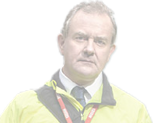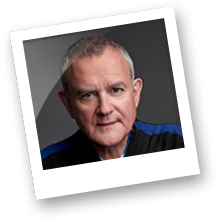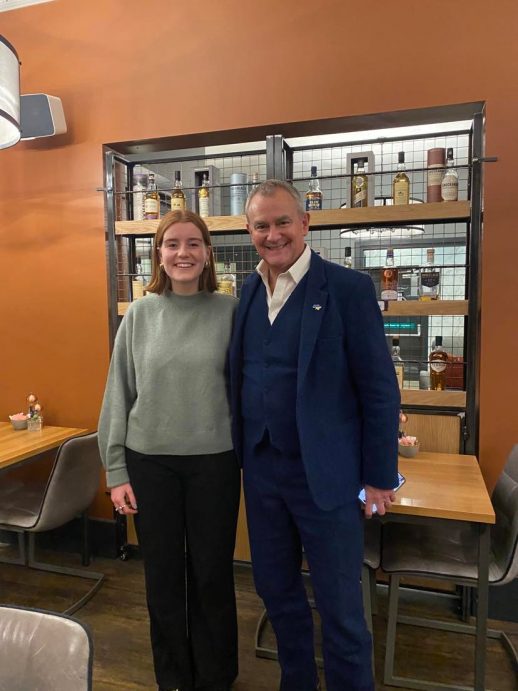Interview by Harriet St Pier for The Saint
An Interview with the Iconic British Actor
Last Monday night, St Andrews played host to one of Britain’s most accomplished and decorated actors, Hugh Bonneville. Perhaps better known as Robert Crawley, Mr Brown, or Ian Fletcher, Bonneville was brought into town by Toppings and Company to speak at the Younger Hall on his new memoir Playing Under the Piano.
I was fortunate enough to meet with Mr Bonneville before his talk to discuss the process of writing the book, his university years and early career ambitions, and how he perceives his own success.
Overwhelmingly personable, Mr Bonneville has the kind of natural charm that immediately puts you at ease. His kindness and good sense of humour are tangible; qualities which also shine through in his book, which is equal parts entertaining, self-deprecating, and emotional.
Indeed, Playing Under the Piano takes readers on a journey through Bonneville’s life and prolific career through a series of charming anecdotes and reflections on his family and co-stars. From insights into the process of creating Iris and Notting Hill; to highly-entertaining mishaps involving changing for auditions in grimy London tube bathrooms and attempts to appear simultaneously in two National Theatre productions in the same evening; to reflections on his father’s final years living with dementia. How did Bonneville find the process of writing a memoir – was it a particularly introspective and personal task to have to undertake?
“I did find it quite an interesting process, in that I set out simply to write a few connected stories about thirty-something years in the business, and actually in doing so I didn’t expect to write about my father’s dementia, or other elements of my family”, he sighs.
“I think in retrospect really, as I talk about it on this book tour, I’m discovering more and more that the reason I did so was because of a realisation of the importance that their influence had on me as I was choosing the path that I ended up following. So I suppose it’s become a thank you note to them, as well as to an industry that I love being a part of”.
Mr Bonneville’s family and close friends certainly play a prominent role in the biography, rubbing shoulders with an otherwise star-studded cast. The book provides insight into colleagues such as Kenneth Branagh, Richard Curtis, Michael Gambon, Kate Winslet, and – of course – the indefatigable ‘dames’ (Maggie Smith, Judi Dench, and Shirley MacLaine). Has he let those people involved in the stories read the book?
“I have, I have. For instance, the chapter on Notting Hill I sent to Richard Curtis – who wrote back saying ‘Oh my God, I’d never even thought about the fact that Notting Hill was a sort of similar roadmap to Four Weddings and a Funeral, how embarrassing!’ But generally people were very supportive”.
“And some of the others are dead, so they can’t sue me”, he adds with a laugh.
He furthers explains that others, such as Richard Eyre and Tim McInnerny, have corrected him on the technical details and pieces of information that he might have forgotten over the passage of time. I tell him how I’ve a friend who frequently tells us that whenever something goes wrong in our lives it’s ‘fodder for the memoirs’. Has he ever had an experience – a particularly funny experience perhaps – where he’s thought to himself “that’ll be useful for a book one day”?
“Oh absolutely. The reason I went through with this audition for George Clooney’s latest film was ultimately because I said to my agent ‘this’ll make a good paragraph in the book’ when I didn’t get the part. Also, I think that in that instance it’s quite useful to show actors who are following in my footsteps that the nature of auditions doesn’t really get any easier as you get older – unless you are, you know, a mega star, which I’m not, I’m just a jobbing actor”.
He’s slightly more than that. His career began on stage at the National Theatre and the RSC, and it only skyrocketed from there. He has received two Emmy nominations for his performances in Downton Abbey; Iris, Twenty Twelve and W1A all secured him BAFTA nominations; and he’s won three SAG awards. His work in the Downton and Paddington franchises in particular has cemented him as something of a British icon. Was there a definitive moment in his career when he realised his own success?
He’s quick to answer. “No. I’m very suspicious of the notion of realising you’re a success. I realise that I’ve kept working, and that’s what matters to me – I have quite a strong work ethic. I don’t have any kind of interest in any of those other trappings that come with the notion of success, apart from the fact that I get to have a wider range of opportunity, and that’s wonderful”.
He’s sceptical of the concept of celebrity, stating he finds the word to be “vacuous and empty.” The word ‘success’ he finds easier to cope with “because I’ve only ever wanted to be good at acting and do what I do”.
“But I’ve never ever felt ‘oh, I’m successful now’, and I think any actor who says ‘I’m now a success’ has probably given up the spirit, because you learn on every job, you learn through every experience. So I’m always striving to do as well as I can, but sometimes you get it wrong. I think if I ever had any success it was getting my equity card in 1986”.
As for his status as a British icon? He’s incredibly proud of the work that he’s done, but doesn’t necessarily conceive of himself in that way: the phrase itself makes him visibly wince. “I personally don’t feel too branded, but I am extremely proud of both of those brands [Downton and Paddington]”, he tells me.
“They have been enormously popular and the hundreds of thousands of people who’ve worked on those shows are the very best of British talent. So I’m extremely proud to be a part of that, and if that’s made those brands well-known abroad, and flown the flag for British enterprise and British TV and film industry, then that’s wonderful”.
Does he feel that it’s a label that has limited his creative and artistic pursuits in any way?
“It hasn’t really pigeon-holed me. I’ve had some finger-wagging comments of people saying ‘you shouldn’t be playing nasty serial killers, you should only play people with bears and labradors’. Well stuff it: I’m an actor, I’m a gun for hire, and I enjoy playing different roles.” He references his latest cinematic pursuit, Netflix crime thriller I came by – where he stars alongside George MacKay as a cruelly-psychopathic former judge, the film’s villain – as evidence. Certainly the film signals a departure from his portrayal of Mr Brown.
Mr Bonneville studied Theology at Cambridge University before attending the Webber Douglas Academy of Dramatic Art in London. Did he know, when he was at university, what his next steps would be?
He states that the most “wonderful” thing about his undergraduate experience was that there was no drama course at Cambridge. “It meant that when I was at university, and I was studying Theology – which was a subject that I loved – the acting fraternity, the acting groups there, were completely diverse in terms of their approach. They were passionate amateurs, but they were architects, engineers, natural scientists, and medics. So it genuinely was a hotchpotch of people who just wanted to put on plays for fun. The auditions were open, and there wasn’t a sense of ‘oh no, this is our department, you can’t possibly do this’”.
“The openness to what drama could be was wonderful. And because I wasn’t a great student, and I wasn’t going to every single lecture, and I was doing a lot of plays, that’s when I discovered this concept of drama school that had really never entered my head before. I thought I was going to read law ultimately, or change and do law after my first degree, and probably try for pupilage. So it was really in my second year when I started talking to a couple of mates who were going to try for drama school, I thought ‘oh, maybe I’ll give it a go too’”.
His advice to university students who are struggling to figure it all out? “I was realistic, I tried to be realistic and pragmatic. I said to myself – in those days you needed an equity card in order to work professionally – ‘I’ll give myself three years to get an equity card, and if I don’t then life’s too short, and I shall go and do something else’. So I think setting yourself realistic, pragmatic targets and goals is sensible: because I’ve seen one or two people who were as passionate about acting as I was who just bashed their heads against brick walls for many years and ended up quite bitter and twisted and having possibly missed the opportunity of developing themselves in other ways earlier”.
He reflects upon his university experiences warmly, however, and encourages students to take all of the various opportunities that university life provides. His greatest lessons were perhaps learned in the theatre rather than the lecture halls; “I wish I’d been a better student”, he laughs, “but I also lived a creative life. [Cambridge] gave me the experience and the opportunity to explore something that I was passionate about that wasn’t on the curriculum. University is different things to different people, but that’s what it was for me”.
Mr Bonneville’s talk later that evening was as charismatic as our conversation had been: evidently, his early years at the National Theatre and the RSC provided him with a phenomenal ability to hold an audience captive in the palm of his hand, telling stories with eloquence and enthusiasm, his timing impeccable. Playing Under the Piano is the same: it’s a true love letter to the business, to his life and career thus far, which balances poignant tales with light-hearted comic relief.









